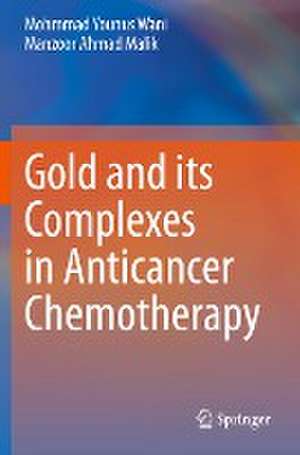Gold and its Complexes in Anticancer Chemotherapy
Autor Mohmmad Younus Wani, Manzoor Ahmad Maliken Limba Engleză Paperback – 12 feb 2022
| Toate formatele și edițiile | Preț | Express |
|---|---|---|
| Paperback (1) | 653.73 lei 38-44 zile | |
| Springer Nature Singapore – 12 feb 2022 | 653.73 lei 38-44 zile | |
| Hardback (1) | 715.35 lei 22-36 zile | |
| Springer Nature Singapore – 12 feb 2021 | 715.35 lei 22-36 zile |
Preț: 653.73 lei
Preț vechi: 688.14 lei
-5% Nou
Puncte Express: 981
Preț estimativ în valută:
125.09€ • 130.96$ • 103.50£
125.09€ • 130.96$ • 103.50£
Carte tipărită la comandă
Livrare economică 02-08 aprilie
Preluare comenzi: 021 569.72.76
Specificații
ISBN-13: 9789813363168
ISBN-10: 9813363169
Pagini: 173
Ilustrații: IX, 173 p. 124 illus., 29 illus. in color.
Dimensiuni: 155 x 235 mm
Ediția:1st ed. 2021
Editura: Springer Nature Singapore
Colecția Springer
Locul publicării:Singapore, Singapore
ISBN-10: 9813363169
Pagini: 173
Ilustrații: IX, 173 p. 124 illus., 29 illus. in color.
Dimensiuni: 155 x 235 mm
Ediția:1st ed. 2021
Editura: Springer Nature Singapore
Colecția Springer
Locul publicării:Singapore, Singapore
Cuprins
Chapter 1. Cancer.- Chapter 2. Types of cancer.- Chapter 3. Classification.- Chapter 4. Cancer or tumor nomenclature.- Chapter 5. Heterogeneity.- Chapter 6. Invasion and metastasis.- Chapter 7. How cancer arises?.- Chapter 8. Epidemiology.- Chapter 9. Economic burden.- Chapter 10. Treatment modalities.- Chapter 11. Chemotherapy.- Chapter 12. Properties of metals and metal complexes.- Chapter 13. Platinum based anticancer agents.- Chapter 14. Chemistry of cisplatin.- Chapter 15. Mechanism of action of platinum drugs.- Chapter 16. Non-platinum anticancer agents.- Chapter 17. Chemistry of gold.- Chapter 18. Gold and its complexes in medicine.- Chapter 19. Auranofin and its analogues.- Chapter 20. Classes of gold complexes.- Chapter 21. Mechanisms of action of anticancer gold complexes.- Chapter 22. Perspectives.
Notă biografică
Dr. Wani graduated from Jamia Millia Islamia, New Delhi, India in 2013. Received a senior research fellowship from CSIR-India and FCT postdoctoral fellowship from Portugal. Worked as a postdoctoral fellow with Prof. A. Sobral group from 2013-2016 on the development of fungal cell wall targeted antifungal therapies. In fall 2016, Dr. Wani moved to the University of Texas, USA and worked with Dr. K. Tsuchikama’s group at Texas Therapeutics Institute, Brown Foundation Institute of Molecular Medicine, UTHealth on the development of non-traditional antimicrobial agents and peptide based cleavable linkers for ADC’s. In fall 2017, Dr. Wani was appointed as assistant professor in Chemistry Department, Faculty of Sciences, University of Jeddah, KSA. Dr. Wani continues to work on the development of new small molecules, metal complexes and novel strategies to combat microbial infections and cancer at the interface of chemistry and biology. He has many international publications, book chapters, and two books, besides many international and national honors and awards to his credit. Dr. Wani is working hard to advance the medicinal chemistry and drug discovery field with new questions and pertinent issues of 21st century.
Manzoor Ahmad Malik was born and raised in district Pulwama of Jammu and Kashmir, India. He did his BSc. from University of Kashmir and received his Master’s in Chemistry from the Department of Chemistry, Jamia Millia Islamia, New Delhi, India. Dr. Malik received M. Phil in Chemistry from Jiwaji University, and Ph.D. from Jamia Millia Islamia, New Delhi, India. He received a Senior Research Fellowship from CSIR, India in 2019. He has several international publications including research articles and book chapters to his credit. His research interests include, design and synthesis of small molecule inhibitors and metal complexes for microbial infections and cancer. Dr. Malik is currently working on the development of non-platinum metal complexes that could be used for anticancer chemotherapy with better efficacy and less toxicity compared to the platinum drugs used in cancer therapy.
Textul de pe ultima copertă
This book presents an overview of cancer and the genesis, and development of different treatment strategies and modalities against cancer. The emergence of gold and its complexes as promising anticancer chemotherapeutic agents have the potential to substitute or replace the platinum based chemotherapeutic agents. Gold complexes have demonstrated considerable anti-proliferative properties, chiefly attributed to their anti-mitochondrial effects, they make gold complexes excellent candidates as anti-cancer agents compared to their platinum-based counterparts. This book provides a critical review of recent advances made in the development of gold complexes as anti-cancer agents. In this context, it examines a number of different ligand architectures, provides comprehensive information on gold complexes’ mechanism of action and toxicity issues and, in closing, outlines future research directions.
Caracteristici
Provides an overview of cancer and the genesis of different treatment strategies and modalities to treat cancer Discusses the emergence of gold and its complexes as anti-cancer agents to replace platinum- based therapy Provides the latest research and developments of gold complexes as anticancer agents Provides future perspectives for the development of gold complexes as alternative anticancer chemotherapeutic agents
